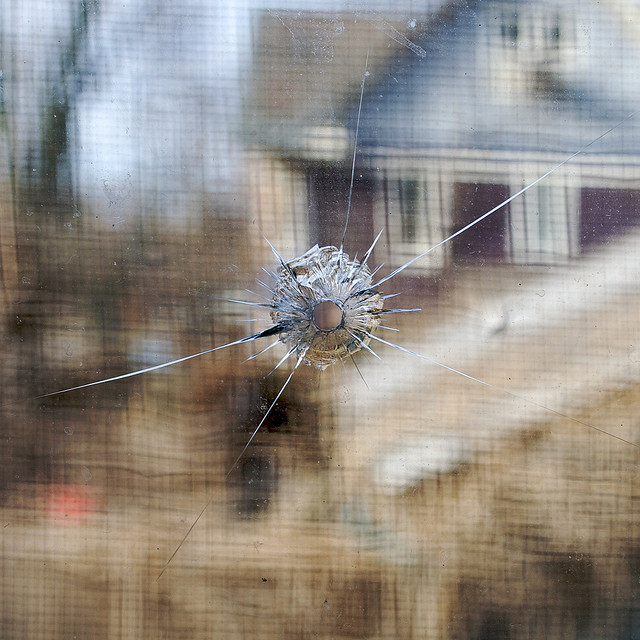Heather Aronson
After the debate, she falls asleep, but only briefly. She wakes, gasping, and sits up in bed. “Should we get a gun?”
Her husband doesn’t answer. He holds his Kindle, his eyes moving behind his glasses.
Maybe she’s still asleep.
But then he speaks. “That’s one of those things you can’t find anymore. Bullets, anyway. Ammunition. It’s like toilet paper. Like printer ink.”
It doesn’t occur to her to ask why he knows this. “But does that mean we need one? You don’t think I’m crazy? I mean, it’s crazy, right?”
They are white liberals with graduate degrees. She is in her fifties; he, his sixties. They have three grown children. They are pro-choice and anti-NRA. They are the They who are coming to take your guns away.
“Hard to say.” Her husband’s eyes are steady on his Kindle.
“Just, he told them to stand by, right? What if, you know, the militia shit?”
It’s hot in the room. Hot for October. She shoves the blankets off and climbs out of bed. “But that’s crazy. Completely crazy. They wouldn’t come here. To our—”
She waits for him to interrupt, but he’s not the interrupting sort.
She is standing for no reason.
She gets back in bed.
The next day, she meets Tom and Han for drinks on their back porch, where she sits roughly six feet away. She pulls off her sweater in the heat, her sunglasses digging into her mask. Talk turns to the debate, to the moment the President called on his supporters to monitor the polls, the election days away.
“Monitor.” Tom makes air quotes.
Han laughs, but it’s harsh. “They’re going to kill us all.”
“Did you see this?” Tom clicks a link on his phone and holds it up. She squints: the President in a sea of red-hatters, most without masks. The President’s voice is raspy with derision. “They ask me, ‘Are you going to go peacefully if you lose?’ Did they give me a peaceful transition?”
Han grabs Tom’s phone and clicks it off.
“Get this,” she finds herself saying. “I actually wondered for a minute if we needed a gun. Can you believe it? How fucking crazy is that?”
Tom and Han eye each other.
“We have one,” Tom says.
With their masks on, it’s hard to tell if they’re joking. She waits for one of them to slap the table, to hoot.
“No you don’t,” she says. “You do not.”
Han shrugs. “I’m not wild about it, TBH.” He says the letters aloud: tea bee aitch.
“You want to see it?” Tom asks.
She does.
Then she doesn’t.
“Oh my God,” she says.
She’s doom-scrolling on her iPad in bed a few nights later when her husband sets his hand on her arm. “Can I tell you something?”
She stiffens: nothing good ever follows this question.
“I bought a gun. But no bullets.”
She probes her brain for terms misheard (dot; fun; no mullets). “What?”
“I bought a gun.”
She sits up in bed.
She doesn’t know what to do with her hands, so she lets them flutter about, until they land on her face.
“You bought a gun?”
“But no bullets. There aren’t any. There’s a shortage.”
“In the house? There’s a gun?”
“But no bullets. It’s just empty. It’s just a gun.”
This is impossible to process. “It’s just? A gun?”
He blinks. “You asked whether—”
“But I didn’t mean do it. I just asked—” She is an interrupter, even of herself. “And where did you—how? You said they’re out! Like toilet paper!”
“I said they’re out of bullets.”
“Like printer ink! You said—”
She climbs out of bed.
She can hear it above them, somehow: a metallic noise.
“It’s in the house, right now?”
“It’s empty.”
“It’s a gun.”
She is a writer.
He is a reader.
They are a story with a gun in it.
They both know what this means.
“If this were a story,” she says.
He sighs. “It’s empty.”
“But then what’s the point? Does it stay empty? Do we just hit someone over the head with it, if they—? If they storm the house, we just—? What’s the point?” She’s pacing, ridiculous in her llama pajama pants and an old ripped T-shirt.
“Do you want me to try to get bullets?”
“No! No. Take it back.”
“You want me to take it back?”
“If this were a story,” she says. “You’d shoot me with it, at the end. Or I’d shoot you. Or— Jesus. The kids.”
He tells her what she already knows: there are no kids in the house.
“But they come in the house! What if we’re not here and they’re sad and they come in the house—? What if we’re eating dinner, and they go upstairs—. They’ll be home for Thanksgiving. Fucking Thanksgiving, and they’re home, and—”
She is spiraling out.
“I can’t,” she says. “I can’t with this.”
She climbs back into bed and picks up her iPad.
“But,” he says, quietly. She feels him fumbling, waiting for her to interrupt.
So she does. “If this were a story,” she says.
He waits for her to finish, but this is all she has.
He folds his hand over hers, gives it a reassuring pat.
“This isn’t a story,” he says.
Heather Aronson’s fiction has appeared in American Short Fiction, CRAFT, Mid-American Review, Story, and Witness, and has been a finalist for several contests, including the 2021 Story Foundation Prize and the 2019 CRAFT Flash Fiction Contest. Her flash piece “What You Know” was nominated for Best Small Fictions 2020. She holds an MFA in Fiction from the University of Arizona and was a Fellow in Fiction at the University of Wisconsin’s Institute for Creative Writing. She lives in Pittsburgh, PA. Follow Heather on Twitter at @heatheraronson1.



